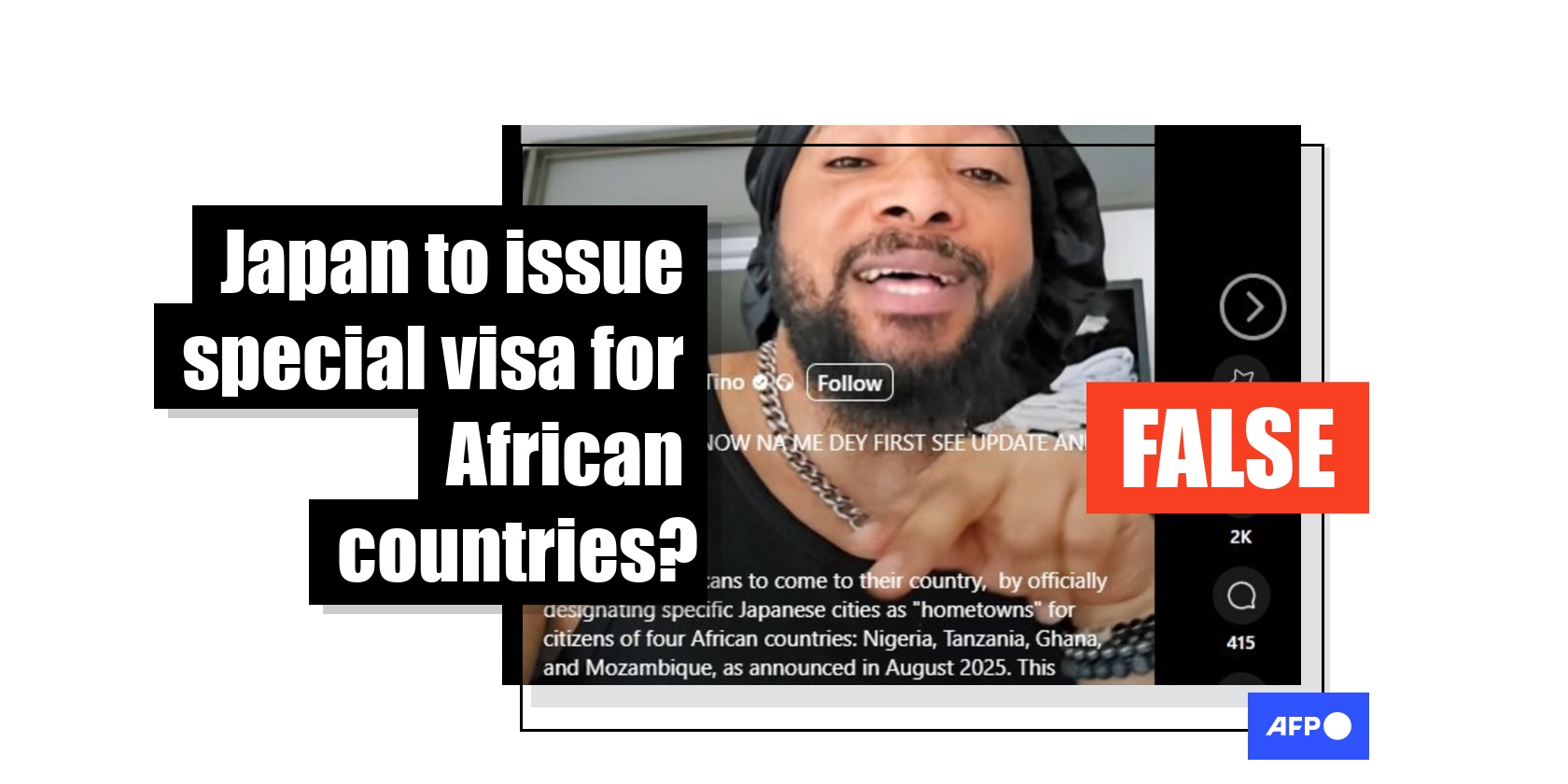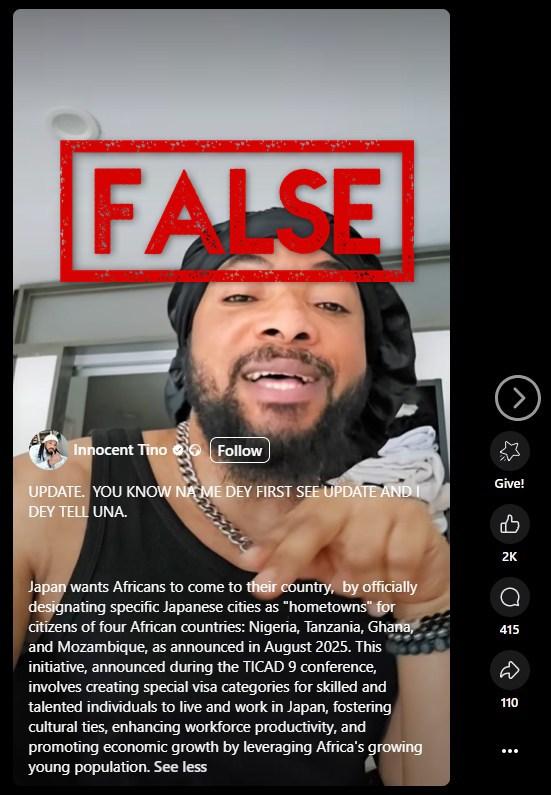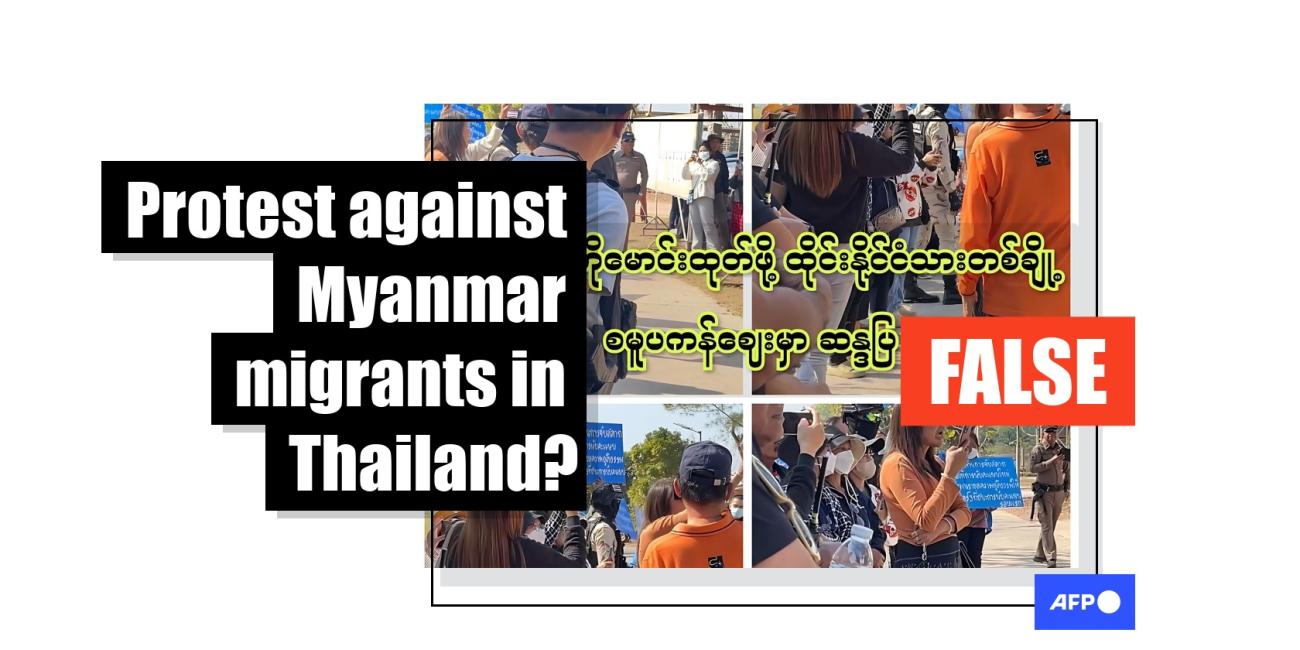
Japan will not issue 'special' visas to citizens of four African countries
- Published on September 9, 2025 at 15:40
- 4 min read
- By Monique NGO MAYAG, AFP Nigeria, AFP Senegal
- Translation and adaptation Samad UTHMAN
A Facebook post published on August 24, 2025, reads: “Japan wants Africans to come to their country, by officially designating specific Japanese cities as 'hometowns' for citizens of four African countries: Nigeria, Tanzania, Ghana, and Mozambique, as announced in August 2025.”
The post adds that “this initiative, announced during the TICAD 9 conference, involves creating special visa categories for skilled and talented individuals to live and work in Japan, fostering cultural ties, enhancing workforce productivity, and promoting economic growth by leveraging Africa’s growing young population”.

Shared more than 100 times by an account called “Innocent Tino”, the post was published with a video in which a narrator claims that the citizens of Nigeria, Tanzania, Ghana, and Mozambique who get the special immigration visa will fill up Tokyo’s labour shortages and resuscitate its declining rural population.
The viral claim was also shared elsewhere on Facebook, here and here, and on X, here and here.
Some regional and local news publishers also shared the claim.
However, these posts are false.
TICAD conference
The Japan International Cooperation Agency (JICA) launched the “Partner Cities” initiative on August 21, 2025, at the TICAD, linking Kisarazu, Sanjo, Imabari, and Nagai with municipalities in Nigeria, Ghana, Mozambique, and Tanzania to promote international exchange.
According to the event’s website, the project aims to “further strengthen ties between African countries and Japanese local governments” (archived here).
“In Japan, promoting international exchanges with a view to regional revitalization is expected to lead to an increase in the populations concerned (sic),” it says.
JICA also mentions “establishing connections that lay the groundwork for future circulation of human resources (from Africa to Japan and vice versa)” without detailing what kind of exchanges will be involved.
After the summit, the Nigerian government published a press release (now deleted but archived here) claiming the partnership “will create a special visa category for highly skilled, innovative, and talented young Nigerians who want to move to Kisarazu to live and work”.
The statement further said that “artisans and other blue-collar workers from Nigeria who are ready to upskill will also benefit from the special dispensation visa to work in Japan”.
Following the statement, confusion spread across African social media platforms.
According to an AFP report, the Japanese partner cities were flooded with complaints from worried residents about Tokyo’s plan to issue visas to citizens of African countries as part of a new immigration policy. A local Imabari municipality official said the city received 460 calls and 1,400 emails (archived here).
Xenophobic claims
A popular X post, published alongside a video on August 25, 2025, and shared more than 1,200 times, also added fuel to the fire.
“Japan has banned people from Nigeria, Ghana, Tanzania, Mozambique from travelling freely in Japan,” the post reads. “They are forced to live & travel only in certain areas. This is because they are notorious for selling drugs, scamming people & making Japan dirty.”
The narrator in the video repeats this, saying Africans will be “confined” in certain areas and that the Japanese government does not want “Africans to mix with Japanese people”.
The video was also published on TikTok, where it was shared more than 8,200 times.
No migration programme
To clarify the claims, JICA published three press releases on August 25, 27 and 29, correcting what it described as misleading media coverage of its “Africa Hometown” initiative (archived here, here and here).
“Some local newspapers and an African government released documents falsely suggesting that under the program, the city of Nagai would now belong to Tanzania, or that special visas would be issued for travel between Japan and the countries concerned. This is completely false (sic),” JICA said on August 25.
The agency emphasised that the scheme linking Japanese municipalities with African countries was intended solely to foster cultural and economic exchange.
On the same day, Japan’s foreign ministry also issued a statement denying any immigration plan or visa arrangement for Africans (archived here).
Government spokesman Yoshimasa Hayashi confirmed this to AFP on August 26, saying: “There are no plans to accept migrants or issue special visas.”
Kisarazu Mayor Yoshikuni Watanabe underlined that the partnership in his city focused strictly on youth education through baseball and softball.
Contacted by AFP, the Nigerian government did not respond to calls and messages, but in a statement published four days after their earlier press release, the West African nation clarified that although JICA designated Kisarazu as Nigeria’s “hometown” under its Africa Hometown programme, the initiative involves only cultural exchange and does not include special visas or immigration schemes (archived here).
Japan’s foreign worker population in 2024 accounted for just under 3% of the total, as the country maintains restrictive immigration policies (archived here).
In the recent upper-house election, the far-right Sanseito party made significant gains, capturing 14 seats on a “Japanese First” platform that includes tighter immigration controls and reduced welfare access for foreigners (archived here).
AFP Fact Check debunked the same claims in French.
Copyright © AFP 2017-2026. Any commercial use of this content requires a subscription. Click here to find out more.
Is there content that you would like AFP to fact-check? Get in touch.
Contact us




